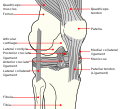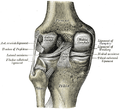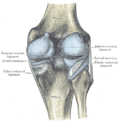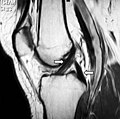Posterior cruciate ligament
Posterior Cruciate Ligament
The Posterior Cruciate Ligament (PCL) is one of the four major ligaments of the knee. It originates from the posterior intercondylar area of the tibia and inserts into the medial condyle of the femur. This ligament is responsible for preventing the tibia from sliding backwards under the femur.
Anatomy[edit]
The PCL is located within the knee. It connects the femur to the tibia. The ligament is named for its posterior insertion on the tibial plateau.
Function[edit]
The primary functions of the PCL is to prevent posterior translation of the tibia on the femur. The PCL is also important in controlling the amount of tibial external and internal rotation.
Clinical significance[edit]
Injury to the PCL can occur as a result of direct impact, such as in an automobile accident, or during sports when an athlete falls on a bent knee with the foot pointed down. The ligament can also be injured by a direct blow to the front of the knee.
Treatment[edit]
Treatment for PCL injuries includes rest, ice, and elevation. Nonsteroidal anti-inflammatory drugs (NSAIDs) may also be used to help reduce pain and swelling. In severe cases, surgery may be required to repair or reconstruct the PCL.
See also[edit]
|
|
|
-
Diagram of the knee joint
-
PCL during extension and hyperextension
-
Anatomy of the knee joint
-
PCL during flexion and hyperflexion
-
Ligaments of the knee
-
Sagittal section of the knee joint
-
MRI of ACL and PCL
-
Posterior cruciate ligament
-
Posterior cruciate ligament
Ad. Transform your life with W8MD's Budget GLP-1 injections from $75


W8MD offers a medical weight loss program to lose weight in Philadelphia. Our physician-supervised medical weight loss provides:
- Weight loss injections in NYC (generic and brand names):
- Zepbound / Mounjaro, Wegovy / Ozempic, Saxenda
- Most insurances accepted or discounted self-pay rates. We will obtain insurance prior authorizations if needed.
- Generic GLP1 weight loss injections from $75 for the starting dose.
- Also offer prescription weight loss medications including Phentermine, Qsymia, Diethylpropion, Contrave etc.
NYC weight loss doctor appointmentsNYC weight loss doctor appointments
Start your NYC weight loss journey today at our NYC medical weight loss and Philadelphia medical weight loss clinics.
- Call 718-946-5500 to lose weight in NYC or for medical weight loss in Philadelphia 215-676-2334.
- Tags:NYC medical weight loss, Philadelphia lose weight Zepbound NYC, Budget GLP1 weight loss injections, Wegovy Philadelphia, Wegovy NYC, Philadelphia medical weight loss, Brookly weight loss and Wegovy NYC
|
WikiMD's Wellness Encyclopedia |
| Let Food Be Thy Medicine Medicine Thy Food - Hippocrates |
Medical Disclaimer: WikiMD is not a substitute for professional medical advice. The information on WikiMD is provided as an information resource only, may be incorrect, outdated or misleading, and is not to be used or relied on for any diagnostic or treatment purposes. Please consult your health care provider before making any healthcare decisions or for guidance about a specific medical condition. WikiMD expressly disclaims responsibility, and shall have no liability, for any damages, loss, injury, or liability whatsoever suffered as a result of your reliance on the information contained in this site. By visiting this site you agree to the foregoing terms and conditions, which may from time to time be changed or supplemented by WikiMD. If you do not agree to the foregoing terms and conditions, you should not enter or use this site. See full disclaimer.
Credits:Most images are courtesy of Wikimedia commons, and templates, categories Wikipedia, licensed under CC BY SA or similar.
Translate this page: - East Asian
中文,
日本,
한국어,
South Asian
हिन्दी,
தமிழ்,
తెలుగు,
Urdu,
ಕನ್ನಡ,
Southeast Asian
Indonesian,
Vietnamese,
Thai,
မြန်မာဘာသာ,
বাংলা
European
español,
Deutsch,
français,
Greek,
português do Brasil,
polski,
română,
русский,
Nederlands,
norsk,
svenska,
suomi,
Italian
Middle Eastern & African
عربى,
Turkish,
Persian,
Hebrew,
Afrikaans,
isiZulu,
Kiswahili,
Other
Bulgarian,
Hungarian,
Czech,
Swedish,
മലയാളം,
मराठी,
ਪੰਜਾਬੀ,
ગુજરાતી,
Portuguese,
Ukrainian











